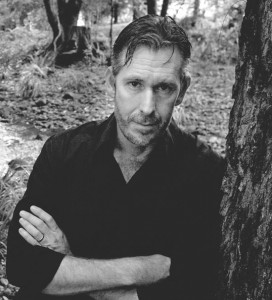 I met award-winning author, Stephen M. Irwin, the old-fashioned way—through strange happenstance. I randomly picked up his first novel, THE DEAD PATH, off the shelf at Barnes & Noble and set it on my bookshelf at home until it insistently called to me and refused to stop calling. Once I got started reading it, I found myself rationing it, not wanting it to end too quickly, and savoring every taste like a fine meal or a swallow of incredible single malt. Before I even finished reading the book, I got in touch with the author on Facebook and haven’t stopped badgering him since. Usually to create more, more, more. We’ve become pals through a shared love of film and fiction, despite living on opposite sides of the planet.
I met award-winning author, Stephen M. Irwin, the old-fashioned way—through strange happenstance. I randomly picked up his first novel, THE DEAD PATH, off the shelf at Barnes & Noble and set it on my bookshelf at home until it insistently called to me and refused to stop calling. Once I got started reading it, I found myself rationing it, not wanting it to end too quickly, and savoring every taste like a fine meal or a swallow of incredible single malt. Before I even finished reading the book, I got in touch with the author on Facebook and haven’t stopped badgering him since. Usually to create more, more, more. We’ve become pals through a shared love of film and fiction, despite living on opposite sides of the planet.
His second supernatural thriller, THE BROKEN ONES, was just released in the U.S. this past week. Number 1 New York Times Bestselling author Lincoln Child says Irwin has a “truly unique and harrowing vision” and Booklist says he “offers cinematic descriptions [with] smoothly incorporated supernatural elements”.
The book description reads as follows:
What happens when every single person is haunted by a ghost only they can see?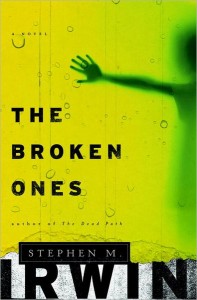
Without warning, a boy in the middle of a city intersection sends Detective Oscar Mariani’s car careening into a busy sidewalk. The scene is bedlam as every person becomes visited by something no one else can see. We are all haunted. Usually, the apparition is someone known: a lost relative, a lover, an enemy. But not always. For Oscar Mariani, the only secret that matters is the unknown ghost who now shares his every waking moment . . . and why.
The worldwide aftershock of what becomes known as “Gray Wednesday” is immediate and catastrophic, leaving governments barely functioning and economies devastated . . . but some things don’t change. When Detective Mariani discovers the grisly remains of an anonymous murder victim in the city sewage system, his investigation will pit him against a corrupt police department and a murky cabal conspiring for power in the new world order.
I’ve raved about Irwin’s first book, THE DEAD PATH, in a previous post. I rate it highly and believe it instantly moved Irwin to the top of the class with the latest crop of stunning supernatural writing talent: Joe Hill, Justin Cronin, and Michael Koryta.
Irwin took some time to chat with me about his writing, his various projects, and his love of story.
_______________
Kane Gilmour: Thanks for taking the time to chat, Steve. Your new book, THE BROKEN ONES, is out now. Tell us a little about it, what drove you to tell this particular story, and what your process for writing it was like.
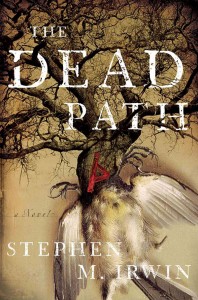 Stephen M. Irwin: A reviewer had said about my first book, THE DEAD PATH, that it was ‘crime noir’. That really stuck in my head; I loved the description. So, when it came to thinking what my second book should be, I figured: why not crime? I’ve long been a fan of the great crime and detective novelists – Chandler, MacDonald, Cruz Smith – and wondered if I could mix up a detective procedural with a ghost story. The ingredients came together when I had a random thought about what it might be like if everyone on earth was haunted – what would that do to the sanity of the population? To economies? To crime? That ‘what if’ question, coupled with my desire to write a police thriller-cum-ghost story, resulted in THE BROKEN ONES.
Stephen M. Irwin: A reviewer had said about my first book, THE DEAD PATH, that it was ‘crime noir’. That really stuck in my head; I loved the description. So, when it came to thinking what my second book should be, I figured: why not crime? I’ve long been a fan of the great crime and detective novelists – Chandler, MacDonald, Cruz Smith – and wondered if I could mix up a detective procedural with a ghost story. The ingredients came together when I had a random thought about what it might be like if everyone on earth was haunted – what would that do to the sanity of the population? To economies? To crime? That ‘what if’ question, coupled with my desire to write a police thriller-cum-ghost story, resulted in THE BROKEN ONES.
KG: You’re a huge fan of short stories, and you’ve written several yourself. Can you tell us how many you’ve written and what your plans are for collecting them into a single-author anthology? Are you bound by your publisher contracts to publish with them or would you consider putting the anthology out yourself?
SMI: I think I consumed a few truckloads of short stories when I was a teenager, mostly works by Bradbury and Lovecraft and King and Carver. I am a huge fan of the form – there is something honest about a story that says: I only need three hundred words to be told, or three thousand; not one hundred thousand words because that’s what readers expect a retail novel to be. I’ve written a few dozen short stories; some of them were ‘learning billets’ that never really worked, but as I improved, some of them got published and won some competitions, which really gave me the encouragement to write my first novel. My publishers have been brilliant and I like to share with them the opportunities to look at the new things I create, but at this stage the notion of an anthology of short stories hasn’t been raised. I’d love to find six months to tweak some of my first-draft short stories and to put to paper some story ideas that I know will be shorts, but my writing commitments seem to be stretching a ways into the future yet. I hope 2013 will be a year when I can find the time to returning to the short story form, and to poetry, not necessarily with a view to publishing, but because some stories can simply only fit into short form, and I’d like to get them out!
KG: As a follow on to the last, what are your overall feelings on the new wave of Self-Publishing and Indie Publishing? Any plans to put something out yourself at some point?
SMI: The idea of self-publishing intrigues and terrifies me. I have been so fortunate with my relationships with the publishing houses I’ve worked with – my publishers and editors have enriched my work and ideas in countless ways. They also contributed some fantastic cover art, marketing, and distribution. To try and do all that myself would be daunting – I have enough trouble finding the time to write and answer the odd email, let alone create an entire self-promotion machine. In short, I place huge value on my relationships with my publishers and editors, and would feel entirely at sea without them.
KG: As a big fan of short stories and supernatural thriller and horror fiction, have you read Joe Hill’s collection, 20th CENTURY GHOSTS, or any of Simon Kurt Unsworth’s great collections? Who are your favorites for short stories in the genre and why?
SMI: One of my favourite short stories from the last decade is ‘Pop Art’ from 20th CENTURY GHOSTS. Joe Hill is witty, adept, and highly imaginative. Some of it might be genetic, but I think he’s just a hard-working and disciplined wordsmith who knows his onions. I haven’t read any of Simon Kurt Unsworth’s works, and now feel a bit like hiding in a cupboard (I will jump onto Amazon now and buy, buy, buy!). I remain a big fan of the short works by masters like Raymond Carver, Graham Greene, and Shirley Jackson, but recent favourites include DARK ROOTS by (fellow Australian) Cate Kennedy and FRAGILE THINGS: SHORT FICTIONS AND WONDERS by Neil Gaiman. Kennedy’s works are grounded in contemporary truths, and I recognise fundamentally the images she creates; Gaiman’s stories are much more various in tone and content, and always surprise. I think that’s what makes a great short story: you are able to ‘plug into’ it quickly and seamlessly, and it takes you somewhere you didn’t expect to go. Perhaps my favourite collection of contemporary short stories is THE PACIFIC AND OTHER STORIES by Mark Helprin. The mark of a great book is that you will return to it again and again; I’ve read ‘The Pacific’ at least a half dozen times.
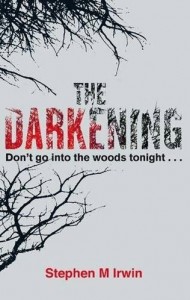 KG: There’s a listing on Amazon for THE DARKENING. Is that an alternate title for THE DEAD PATH? If so, why the title change?
KG: There’s a listing on Amazon for THE DARKENING. Is that an alternate title for THE DEAD PATH? If so, why the title change?
SMI: That decision was taken by Sphere, who published the book in the UK. I honestly couldn’t tell you why they wanted to do it, but I deferred to what I hoped was their better judgment.
KG: As an author who prepared for writing across genres by creating a few still top-secret pen-names, I’m fascinated by this sort of thing: What’s the ‘M’ stand for, and why use the initial? You’re the only Stephen Irwin that shows up on Amazon. Distinguishing yourself from the late Crocodile Hunter? Did you give a lot of thought to your author name, or just natuarlly go with what you use?
SMI: M is, boringly, for Mark (my middle name). I could change it to something more intriguing by deed poll (Meringue? Murder? Mood-ring?) but I think I have better things to spend my cash on. The inclusion was, as you rightly suggest, to ensure people don’t mix me up with the late and much-missed croc man. I must say, his name is still well recognised and has its benefits to me: before his fame, I used to have to spell out my surname to people who would instead default to Urwin or Irvine or Erwing; now I just say ‘Like the Crocodile Hunter’. Did it take much thought to include the ‘M’ in my author name? About twelve seconds. I think (and hope) readers care about the work, not the author name.
KG: You are also an actor and screenwriter. What are some of your acting credits? How about your most famous screenwriting credits?
SMI: I used to want to be an actor quite a lot. I was fortunate enough to do some study at the American Academy of Dramatic Art in New York many moons ago, but I never quite had enough drive to pursue acting and acting alone – I got too caught up in other aspects of filmmaking, particularly directing and writing. Nevertheless, I’ve kept my hand in to a small extent, with roles in television commercials and small TV speaking parts in drama series (including a tiny role in a US series some years ago called ‘The Starter Wife’) because I think its much easier to write dialogue if you know with some first-hand experience whether or not it can be spoken by an actor. Regarding screenwriting credits, I am a prolifically unproduced writer; I’ve been paid to write a lot of television episodes and feature films, but they are all in pre-production orbit (or limbo!); I’ve certainly had some documentaries televised and some short films produced (look for ‘Ascension’ on Youtube). But this year I am writing three feature films, and it is looking very good that the first – a romantic comedy of all things! – will be in production in December.
KG: You are working on a number of screenwriting projects right now. One of them struck me as something that fans of your supernatural thrillers might want to pounce on: Night Fare. What can you tell us about this project and when can we expect to see it?
SMI: It is a great fun series in the vein of ‘Kolchak: The Night Stalker’ but with a more robust ‘Last Boy Scout’ energy and irreverence. I can’t tell you much, since the project is currently being developed by the Emmy Award winning cleveries at Hoodlum (who have made a lot of online material for shows like ‘Spooks’, ‘Lost’, and ‘Flash Forward’. I believe it is being marketed to networks in the US as I write this, so fingers crossed I might have some news about production in 2013.
KG: You’ve also got Australian film company, Hoodlum, interested in doing a mini-series of your first novel, THE DEAD PATH. Can you tell us about this project?
SMI: It’s very exciting that Hoodlum have optioned my first novel. This is only a recent development, so I’m not sure yet who might be doing the screen adaptation, or how many parts the work will be. I’m very curious to see what transpires myself – I’ll keep you posted!
KG: Any trunk novels lying around or novels out under any pseudonyms?
SMI: I have a draft supernatural thriller that was almost working for me, and after I finished it I realised I had to change the gender of the protagonist. It is a great story, set in the Antarctic, and I’m at the pleasurable place where I now need to decide if I’m going to do the rewrite as a novel or a feature film.
KG: You are working on your third novel now, is it too early to tell what the project is about or what you are calling it? When will we see it?
SMI: The working title is THE SLEEP, and it’s pretty epic in scale and scope. I can’t really tell you much more, except that it is a bit more of an ensemble piece than my last two novels – if you’re a Stephen King fan, think THE STAND. Big and sweeping and a whole lot of dangerous fun.
KG: Tell us a little about your office and what your writing day looks like. Do you have a routine? Goals for the day? Do you do all your writing on that Macbook Pro you mention on your website?
SMI: I do love my Macbook. I am not an Apple zealot (they do some things that frustrate me!) but I like the machine’s robustness. In the home office, I plug it into a 24” monitor mounted on a standing desk, and that’s where I work. Standing helps my posture (he said, waving his walking stick – ya listenin’, sonny?) and offsets the migraines that I’ve had all my life. I have my fun things in my office – a nice big blueprint schematic of a Supermarine Spitfire, a collection of old stills cameras, my dad’s binoculars, and of course a heavily laden bookshelf. I have a big magnetic whiteboard to which I attach index cards with fridge magnets when I’m plotting. Routine? I have two young kids. I write when I don’t have to look after them! Goals? Well, I like deadlines. Without them, I’d mooch about looking at Triumph motorcycle websites. The goal is, write as much as possible to avoid embarrassment.
KG: Finally, will you be doing a book tour for THE BROKEN ONES? If so, will it bring you to North America?
SMI: Man, I wish I was coming to the US for THE BROKEN ONES. Doubleday are the publisher and they’ve been amazing – and it is great to see the book is now with the Book of the Month Club. But a book tour is a big and expensive exercise for publisher and author, and I think once my readers in the US grow, that might be an option. But right now, the crocodile hunter is still the most famous Steve Irwin. But I’m working on it!
Thanks for taking the time to talk with us, Steve.
_______________
THE BROKEN ONES is available now at the following links:
.
.
.
.
If you didn’t snatch one up yet, you know you want one now. Go get it.




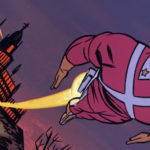
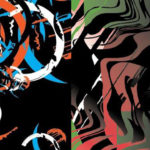


Promotion
I stumbled on your blog on https://kanegilmour.com/stephen-m-irwin-the-new-duke-of-spook/ and I’m so happy I did. I feel as though you’re reading my mind right now.
You seem to know a lot concerning this, as if you authored a textbook on it or
something. I think that you can do with a few pics to
drive the message home a bit, but other than that, this is great blog.
I will certainly return.